语言学教程Chapter5-Semantics
- 格式:ppt
- 大小:6.62 MB
- 文档页数:88
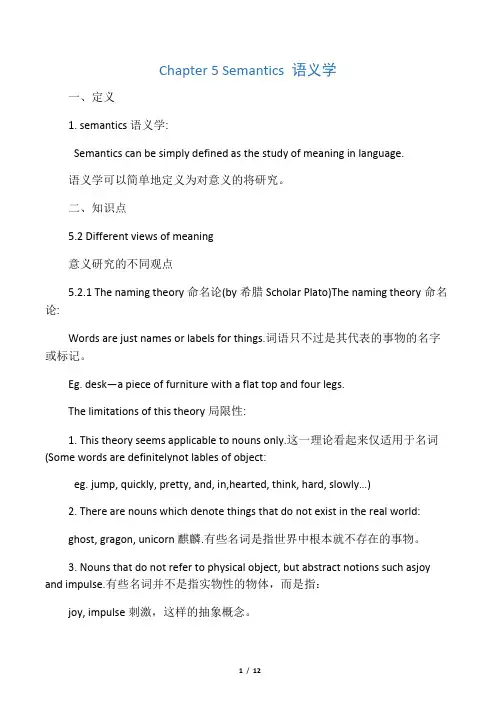
Chapter 5 Semantics 语义学一、定义1. semantics语义学:Semantics can be simply defined as the study of meaning in language.语义学可以简单地定义为对意义的将研究。
二、知识点5.2 Different views of meaning意义研究的不同观点5.2.1 The naming theory命名论(by希腊Scholar Plato)The naming theory命名论:Words are just names or labels for things.词语只不过是其代表的事物的名字或标记。
Eg. desk—a piece of furniture with a flat top and four legs.The limitations of this theory局限性:1. This theory seems applicable to nouns only.这一理论看起来仅适用于名词(Some words are definitelynot lables of object:eg. jump, quickly, pretty, and, in,hearted, think, hard, slowly…)2. There are nouns which denote things that do not exist in the real world:ghost, gragon, unicorn麒麟.有些名词是指世界中根本就不存在的事物。
3. Nouns that do not refer to physical object, but abstract notions such asjoy and impulse.有些名词并不是指实物性的物体,而是指:joy, impulse刺激,这样的抽象概念。

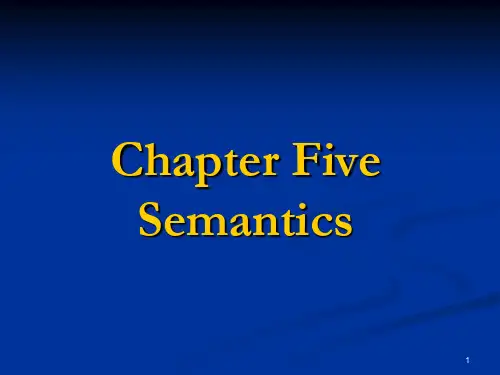
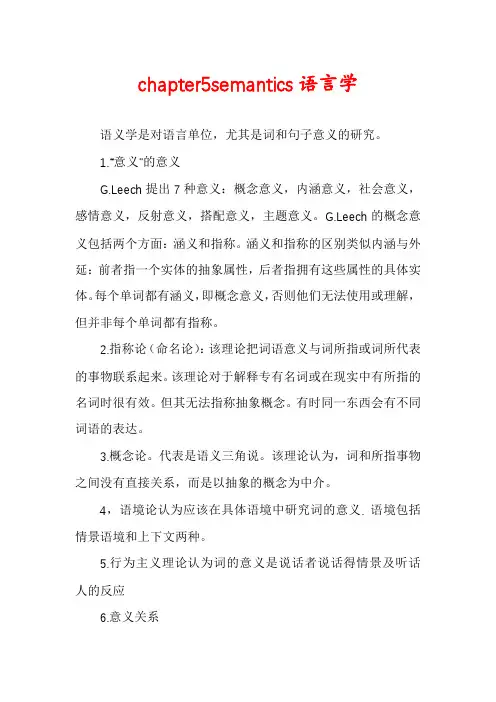
chapter5semantics语言学语义学是对语言单位,尤其是词和句子意义的研究。
1.“意义”的意义G.Leech提出7种意义:概念意义,内涵意义,社会意义,感情意义,反射意义,搭配意义,主题意义。
G.Leech的概念意义包括两个方面:涵义和指称。
涵义和指称的区别类似内涵与外延:前者指一个实体的抽象属性,后者指拥有这些属性的具体实体。
每个单词都有涵义,即概念意义,否则他们无法使用或理解,但并非每个单词都有指称。
2.指称论(命名论):该理论把词语意义与词所指或词所代表的事物联系起来。
该理论对于解释专有名词或在现实中有所指的名词时很有效。
但其无法指称抽象概念。
有时同一东西会有不同词语的表达。
3.概念论。
代表是语义三角说。
该理论认为,词和所指事物之间没有直接关系,而是以抽象的概念为中介。
4,语境论认为应该在具体语境中研究词的意义. 语境包括情景语境和上下文两种。
5.行为主义理论认为词的意义是说话者说话得情景及听话人的反应6.意义关系词语词之间的主要意义关系:相同关系,相反关系,包含关系a.同义关系。
完全同义关系很少,所谓的同一都依赖语境,并总在某方面不同。
(方言,内涵,文体等)b.反义关系主要包括:等级反义关系,互补反义关系,关系反义关系。
1)等级反义的特点:第一,否定一方并不必然是肯定另一方,还有中间状态;第二,没有绝对评判标准,标准随对象而改变。
第三,通常用其中表示较高程度的词来覆盖整个量级。
覆盖性词被称为“无标记的”,即一般性的;被覆盖词被称为“有标记的”,即特殊的。
一般使用覆盖性词语。
一旦使用被覆盖词语,表示有某种特殊的、不一般的情况。
第四,可用very修饰,可有比较级最高级2)互补反义关系,第一,肯定一方意味着否定另一方。
反之亦然。
第二,不用very修饰,没有比较级最高级。
第三,评判标准绝对。
没有覆盖性词语3)关系(反向)反义关系,表现两个实体间的一种反向关系,不构成肯否定对立。
一个预设着另一个的存在。
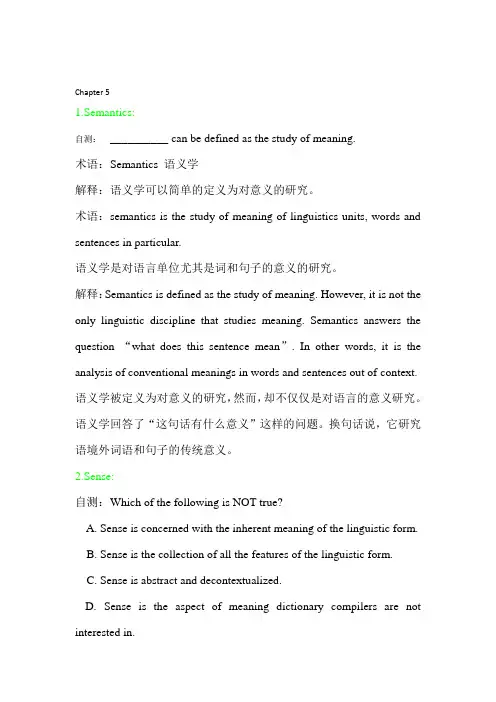
Chapter 51.Semantics:自测: __________ can be defined as the study of meaning.术语:Semantics 语义学解释:语义学可以简单的定义为对意义的研究。
术语:semantics is the study of meaning of linguistics units, words and sentences in particular.语义学是对语言单位尤其是词和句子的意义的研究。
解释:Semantics is defined as the study of meaning. However, it is not the only linguistic discipline that studies meaning. Semantics answers the question “what does this sentence mean”. In other words, it is the analysis of conventional meanings in words and sentences out of context. 语义学被定义为对意义的研究,然而,却不仅仅是对语言的意义研究。
语义学回答了“这句话有什么意义”这样的问题。
换句话说,它研究语境外词语和句子的传统意义。
2.Sense:自测:Which of the following is NOT true?A. Sense is concerned with the inherent meaning of the linguistic form.B. Sense is the collection of all the features of the linguistic form.C. Sense is abstract and decontextualized.D. Sense is the aspect of meaning dictionary compilers are not interested in.术语:Sense 涵义解释:涵义指一个实体的抽象属性。
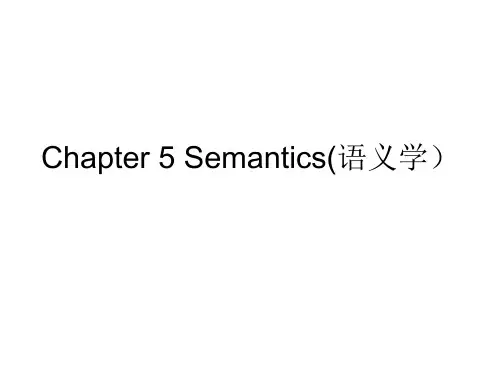
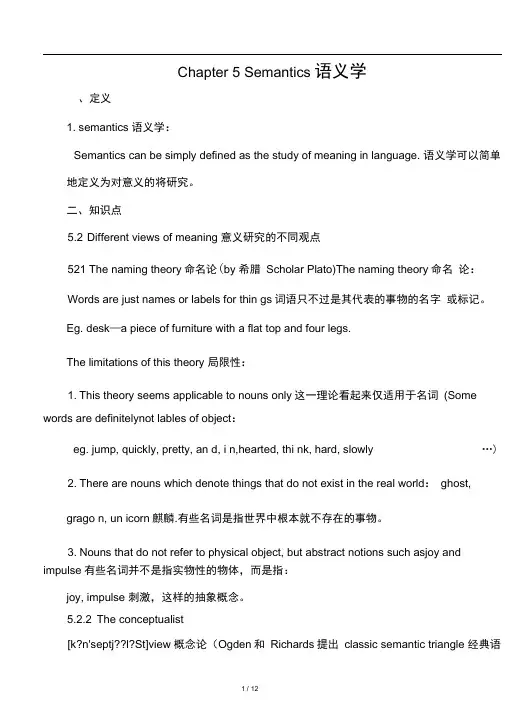
Chapter 5 Semantics 语义学、定义1. semantics 语义学:Semantics can be simply defined as the study of meaning in language. 语义学可以简单地定义为对意义的将研究。
二、知识点5.2 Different views of meaning 意义研究的不同观点521 The naming theory命名论(by 希腊Scholar Plato)The naming theory命名论:Words are just names or labels for thin gs词语只不过是其代表的事物的名字或标记。
Eg. desk—a piece of furniture with a flat top and four legs.The limitations of this theory 局限性:1. This theory seems applicable to nouns only这一理论看起来仅适用于名词(Some words are definitelynot lables of object:eg. jump, quickly, pretty, an d, i n,hearted, thi nk, hard, slowly …)2. There are nouns which denote things that do not exist in the real world: ghost,grago n, un icorn麒麟.有些名词是指世界中根本就不存在的事物。
3. Nouns that do not refer to physical object, but abstract notions such asjoy and impulse有些名词并不是指实物性的物体,而是指:joy, impulse 刺激,这样的抽象概念。
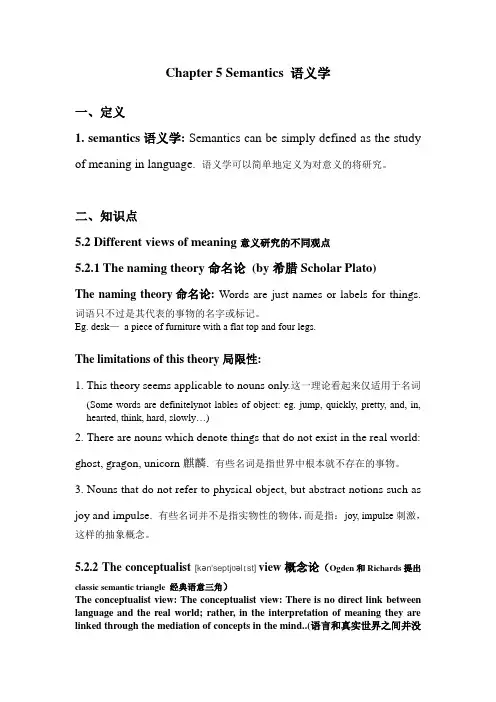
Chapter 5 Semantics 语义学一、定义1. semantics语义学: Semantics can be simply defined as the study of meaning in language. 语义学可以简单地定义为对意义的将研究。
二、知识点5.2 Different views of meaning意义研究的不同观点5.2.1 The naming theory命名论(by希腊Scholar Plato)The naming theory命名论: Words are just names or labels for things.词语只不过是其代表的事物的名字或标记。
Eg. desk—a piece of furniture with a flat top and four legs.The limitations of this theory局限性:1. This theory seems applicable to nouns only.这一理论看起来仅适用于名词(Some words are definitelynot lables of object: eg. jump, quickly, pretty, and, in, hearted, think, hard, slowly…)2. There are nouns which denote things that do not exist in the real world: ghost, gragon, unicorn麒麟. 有些名词是指世界中根本就不存在的事物。
3. Nouns that do not refer to physical object, but abstract notions such as joy and impulse. 有些名词并不是指实物性的物体,而是指:joy, impulse刺激,这样的抽象概念。
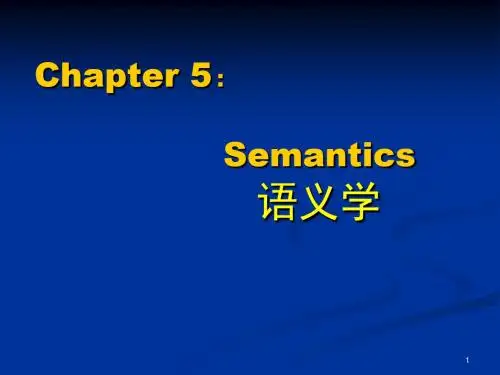
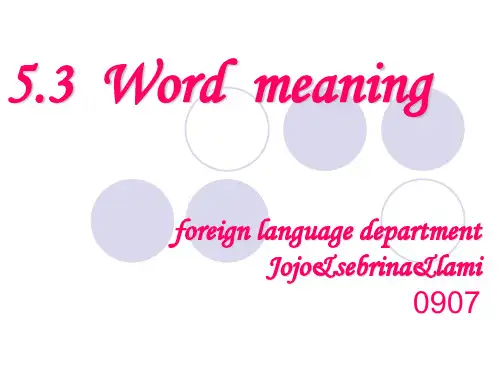

Chapter 5 Semantics 语义学1.What is semantics?什么是语义学?Semantics can be simply defined as the study of meaning in language.语义学可定义为对语言意义的研究。
2.Some views concerning the study of meaning语义研究的几种主要理论1)The naming theory 命名论It was proposed by the ancient Greek scholar Plato. According to this theory, the linguistic forms or symbols, in other words, the words used in a language are taken to be labels of the objects they stand for. So words are just names or labels for things.命名论是最原始的语义理论,是古希腊学者柏拉图提出的。
该理论把词看作是该词所指事物的名称或标记。
2)The conceptualist view 意念论The conceptualist view holds that there is no direct link between a linguistic form and what it refers to; rather, in the interpretation of meaning they are linked through the mediation of concepts in the mind.意念论认为,语言形式及其所代表的对象之间(即语言与现实世界之间)没有直接联系;确切地说,在理解语义时,是通过大脑中存在意念这一中介物来联系的。